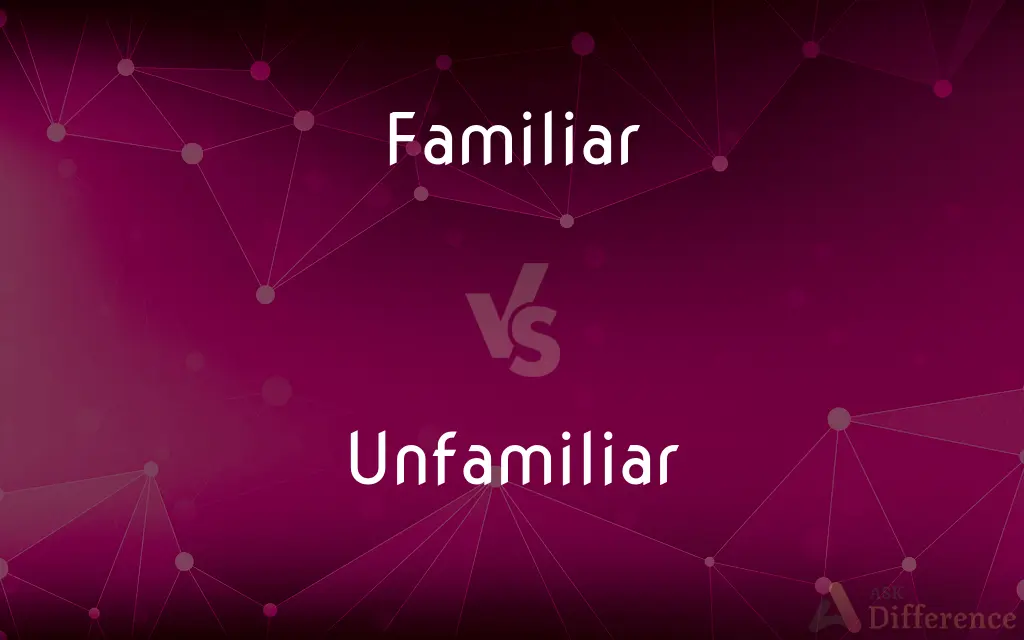Familiar vs. Unfamiliar — What's the Difference?
By Tayyaba Rehman — Updated on October 28, 2023
Familiar refers to something known or easily recognized. Unfamiliar denotes something not known or not experienced before. They are opposites in terms of recognition or experience.

Difference Between Familiar and Unfamiliar
Table of Contents
ADVERTISEMENT
Key Differences
Familiar and Unfamiliar are terms that relate to our recognition, knowledge, or experience of something. Familiar is something that is known, recognized, or well understood by an individual. It's what we've encountered or experienced before and therefore is not strange or unexpected to us. On the other hand, Unfamiliar represents that which is unknown or not recognized, signifying new experiences or concepts yet to be understood.
When you walk into your own home, you are in a Familiar setting. You recognize the surroundings, know where everything is, and feel a sense of comfort. Conversely, walking into a stranger's house introduces you to an Unfamiliar environment. You might not know where things are, and there's a sense of newness or unpredictability.
Language learners often categorize words or phrases as Familiar or Unfamiliar. Familiar words are those they've learned, practiced, and can use comfortably. Unfamiliar words, however, are new entries they have yet to master, requiring more attention and practice to become part of their active vocabulary.
In relationships, a Familiar person could be a close friend, family member, or someone we interact with regularly. We know their habits, their likes, and dislikes. An Unfamiliar person is someone we've just met or don't know well, and thus, there's a lot to discover and understand about them.
Comparison Chart
Definition
Known or easily recognized
Not known or experienced before
ADVERTISEMENT
Comfort level
Often associated with comfort and ease
Can invoke curiosity or discomfort due to newness
Use in language
Words/phrases one is used to
Words/phrases yet to be learned
Relationship context
Refers to close friends or known individuals
Refers to strangers or those not known well
Predictability
Expected outcomes or known patterns
Unexpected outcomes or unknown patterns
Compare with Definitions
Familiar
Well-known through long association or recognition.
Her voice was Familiar, even though I couldn't see her.
Unfamiliar
Not experienced before.
He felt an Unfamiliar emotion welling up.
Familiar
Having personal knowledge or firsthand experience.
He's Familiar with the challenges of running a business.
Unfamiliar
Strange or out of the ordinary.
There was an Unfamiliar scent in the air.
Familiar
Well known from long or close association
A familiar voice
Their faces will be familiar to many of you
Unfamiliar
Different from what one is used to.
The customs of the foreign country were Unfamiliar.
Familiar
In close friendship; intimate
She had not realized they were on such familiar terms
Unfamiliar
Not recognized or known.
The streets were Unfamiliar to the tourist.
Familiar
A demon supposedly attending and obeying a witch, often said to assume the form of an animal
Her familiars were her two little griffons that nested in her skirts
Unfamiliar
Not having knowledge or experience.
She was Unfamiliar with the latest technology.
Familiar
A close friend or associate.
Unfamiliar
Not being acquainted; not conversant
Unfamiliar with the roads here.
Familiar
(in the Roman Catholic Church) a person rendering certain services in a pope's or bishop's household.
Unfamiliar
Not within one's knowledge; strange
Unfamiliar faces.
Familiar
Often encountered or seen
A familiar landmark.
Unfamiliar
Strange, not familiar.
Familiar
Having fair knowledge; acquainted
Are you familiar with these roads?.
Unfamiliar
An unfamiliar person; a stranger.
Familiar
Of established friendship; intimate
We are on familiar terms.
Unfamiliar
Not known or well known;
A name unfamiliar to most
Be alert at night especially in unfamiliar surroundings
Familiar
Natural and unstudied; informal
Lectured in a familiar style.
Familiar
Taking undue liberties; presumptuous
Students should not be familiar toward an instructor.
Familiar
Familial.
Familiar
Domesticated; tame. Used of animals.
Familiar
A close friend or associate.
Familiar
An attendant spirit, often taking animal form.
Familiar
One who performs domestic service in the household of a high official.
Familiar
A person who frequents a place.
Familiar
Known to one, or generally known; commonplace.
There’s a familiar face; that tune sounds familiar.
Familiar
Acquainted.
I'm quite familiar with this system; she's not familiar with manual gears.
Familiar
Intimate or friendly.
We are on familiar terms now; our neighbour is not familiar
Don’t be familiar with me, boy!
Familiar
Of or pertaining to a family; familial.
Familiar
(witchcraft) An attendant spirit, often in animal or demon form.
The witch’s familiar was a black cat.
Familiar
(obsolete) A member of one's family or household.
Familiar
A member of a pope's or bishop's household.
Familiar
(obsolete) A close friend.
Familiar
(historical) The officer of the Inquisition who arrested suspected people.
Familiar
Of or pertaining to a family; domestic.
Familiar
Closely acquainted or intimate, as a friend or companion; well versed in, as any subject of study; as, familiar with the Scriptures.
Familiar
Characterized by, or exhibiting, the manner of an intimate friend; not formal; unconstrained; easy; accessible.
Be thou familiar, but by no means vulgar.
Familiar
Well known; well understood; common; frequent; as, a familiar illustration.
That war, or peace, or both at once, may beAs things acquainted and familiar to us.
There is nothing more familiar than this.
Familiar
Improperly acquainted; wrongly intimate.
Familiar
An intimate; a companion.
All my familiars watched for my halting.
Familiar
An attendant demon or evil spirit.
Familiar
A confidential officer employed in the service of the tribunal, especially in apprehending and imprisoning the accused.
Familiar
A person attached to the household of a high official (as a pope or bishop) who renders service in return for support
Familiar
A person who is frequently in the company of another;
Drinking companions
Comrades in arms
Familiar
A spirit (usually in animal form) that acts as an assistant to a witch or wizard
Familiar
Well known or easily recognized;
A familiar figure
Familiar songs
Familiar guests
Familiar
Within normal everyday experience; common and ordinary; not strange;
Familiar ordinary objects found in every home
A familiar everyday scene
A familiar excuse
A day like any other filled with familiar duties and experiences
Familiar
(usually followed by `with') well informed about or knowing thoroughly;
Conversant with business trends
Familiar with the complex machinery
He was familiar with those roads
Familiar
Having mutual interests or affections; of established friendship;
On familiar terms
Pretending she is on an intimate footing with those she slanders
Familiar
Frequently encountered or seen.
This problem is Familiar to many students.
Familiar
Informal, friendly, or intimate.
She shared a Familiar joke with her childhood friend.
Familiar
Resembling or reminding one of something.
The movie's theme was Familiar to classic love stories.
Common Curiosities
If I travel to a new country, would the surroundings be Familiar or Unfamiliar?
Typically, they would be Unfamiliar since they are new and not previously experienced.
What does Familiar mean?
Familiar refers to something that is known, recognized, or well understood.
Is Unfamiliar the opposite of Familiar?
Yes, Unfamiliar denotes something not known or experienced before, making it the opposite of Familiar.
Is a Familiar route one I take regularly?
Typically, yes. A Familiar route is one you know well and have traveled often.
If I meet a friend after many years, would our conversation be Familiar or Unfamiliar?
It could be both. While the person is Familiar, the updates and changes over years might be Unfamiliar.
Is it possible for something Familiar to become Unfamiliar over time?
Yes, if one loses touch or memory of something, it can become Unfamiliar.
Can reading a book make an Unfamiliar subject become Familiar?
Yes, gaining knowledge or experience on a topic can transition it from Unfamiliar to Familiar.
Are there antonyms for Unfamiliar other than Familiar?
Yes, antonyms include known, accustomed, and recognized.
Can Unfamiliar situations be beneficial?
Yes, Unfamiliar situations can lead to new experiences, learning, and personal growth.
Is Familiar always associated with comfort?
Often, but not always. While Familiarity can bring comfort, some Familiar situations can be uncomfortable.
Can a person be described as Familiar?
Yes, a person you know well or see often can be described as Familiar.
Can I be Unfamiliar with a topic in a conversation?
Yes, being Unfamiliar with a topic means you don't have knowledge or experience about it.
Which word indicates a lack of knowledge or experience?
Unfamiliar indicates a lack of knowledge or experience.
Are there synonyms for Familiar?
Yes, synonyms include known, accustomed, and recognized.
Can someone feel both Familiar and Unfamiliar at the same time?
Yes, a situation might have both known and unknown elements, creating a mix of Familiar and Unfamiliar feelings.
Share Your Discovery

Previous Comparison
So vs. Thus
Next Comparison
Single vs. TakenAuthor Spotlight
Written by
Tayyaba RehmanTayyaba Rehman is a distinguished writer, currently serving as a primary contributor to askdifference.com. As a researcher in semantics and etymology, Tayyaba's passion for the complexity of languages and their distinctions has found a perfect home on the platform. Tayyaba delves into the intricacies of language, distinguishing between commonly confused words and phrases, thereby providing clarity for readers worldwide.















































